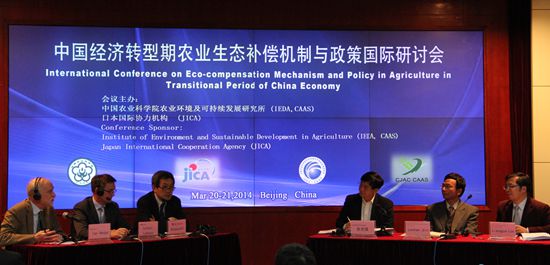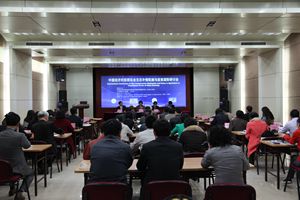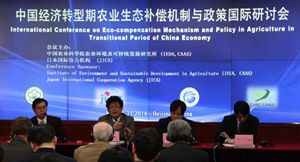分享到
International Conference on Eco-compensation Mechanism and Policy in Agriculture held in Beijing
The International Conference on Eco-compensation Mechanism and Policy in Agriculture in Transitional Period of Chinese Economy was held on March 20 in Beijing. The conference was jointly organized by Institute of Environment and Sustainable Development in Agriculture (IEDA) of Chinese Academy of Agricultural Sciences (CAAS) and Japan International Cooperation Agency (JICA). More than 70 experts from 20 scientific research institutions from China, Japan, Germany, UK and international organizations such as FAO and UNEP attended the conference.

The conference brought together the world top economists and environmentalists to share their updated research progress and insight on Eco-compensation or Payment for Environmental Service (PES) in agriculture. This is follow up of the China central government’s proposition on promoting the ecological progress and developing environmentally friendly agriculture.
 Prof. Mikitaro Shobayashi from Gakushuin Women's College-Tokyo gave his presentation on the linkage between agricultural and agri-environmental policies in OECD countries, indicating that many OECD countries have been shifting from price support to direct payments, and also from coupled payments to decoupled payments. The share of agri-environmental payments has been increasing in many OECD countries in past recent due to this arrangement. Prof. Ian Hodge from University of Cambridge (UK) gave a review of thirty years’ evolution of European agri-environment policies. He showed changes of agricultural environmental policy with social development and challenges. The review reviled the fact that the implementation of policy is a learning process for both governments and farmers and has the scope for improvements in cost effectiveness.
Prof. Mikitaro Shobayashi from Gakushuin Women's College-Tokyo gave his presentation on the linkage between agricultural and agri-environmental policies in OECD countries, indicating that many OECD countries have been shifting from price support to direct payments, and also from coupled payments to decoupled payments. The share of agri-environmental payments has been increasing in many OECD countries in past recent due to this arrangement. Prof. Ian Hodge from University of Cambridge (UK) gave a review of thirty years’ evolution of European agri-environment policies. He showed changes of agricultural environmental policy with social development and challenges. The review reviled the fact that the implementation of policy is a learning process for both governments and farmers and has the scope for improvements in cost effectiveness.
The principles for the design and implementation of efficient agri-environmental policies, presentation of Prof. Uwe Latacz-Lohmann from University of Kiel pointed out splitting total payment into two installments (one linked to activities and one linked to outcomes). This arrangement is effective solution to ensure farmer’s conservation activities and outcomes. However, innovative design approaches and implementation strategies can mitigate the adverse impact from information asymmetry and lack of appropriate incentives for environmental policy performance.
 Prof. Jin leshan from China Agriculture University, Prof. Zhang Keqiangfrom Agro-environmental Protection Institute-MOA, Prof. Zhang Huiyuan from Chinese Research Academy of Environmental Sciences and Prof. Luo Liangguo from the IEDA of CAAS gave their presentations on policies, regulations and practices and explorations on ecological compensation for promoting environment-friendly agriculture technologies in China. After each presentation, in-depth discussion on hot issues concerning agricultural eco-compensation were given priority to ensure understanding of the subject matter by members.
Prof. Jin leshan from China Agriculture University, Prof. Zhang Keqiangfrom Agro-environmental Protection Institute-MOA, Prof. Zhang Huiyuan from Chinese Research Academy of Environmental Sciences and Prof. Luo Liangguo from the IEDA of CAAS gave their presentations on policies, regulations and practices and explorations on ecological compensation for promoting environment-friendly agriculture technologies in China. After each presentation, in-depth discussion on hot issues concerning agricultural eco-compensation were given priority to ensure understanding of the subject matter by members.

 Prof. Mikitaro Shobayashi from Gakushuin Women's College-Tokyo gave his presentation on the linkage between agricultural and agri-environmental policies in OECD countries, indicating that many OECD countries have been shifting from price support to direct payments, and also from coupled payments to decoupled payments. The share of agri-environmental payments has been increasing in many OECD countries in past recent due to this arrangement. Prof. Ian Hodge from University of Cambridge (UK) gave a review of thirty years’ evolution of European agri-environment policies. He showed changes of agricultural environmental policy with social development and challenges. The review reviled the fact that the implementation of policy is a learning process for both governments and farmers and has the scope for improvements in cost effectiveness.
Prof. Mikitaro Shobayashi from Gakushuin Women's College-Tokyo gave his presentation on the linkage between agricultural and agri-environmental policies in OECD countries, indicating that many OECD countries have been shifting from price support to direct payments, and also from coupled payments to decoupled payments. The share of agri-environmental payments has been increasing in many OECD countries in past recent due to this arrangement. Prof. Ian Hodge from University of Cambridge (UK) gave a review of thirty years’ evolution of European agri-environment policies. He showed changes of agricultural environmental policy with social development and challenges. The review reviled the fact that the implementation of policy is a learning process for both governments and farmers and has the scope for improvements in cost effectiveness.The principles for the design and implementation of efficient agri-environmental policies, presentation of Prof. Uwe Latacz-Lohmann from University of Kiel pointed out splitting total payment into two installments (one linked to activities and one linked to outcomes). This arrangement is effective solution to ensure farmer’s conservation activities and outcomes. However, innovative design approaches and implementation strategies can mitigate the adverse impact from information asymmetry and lack of appropriate incentives for environmental policy performance.
 Prof. Jin leshan from China Agriculture University, Prof. Zhang Keqiangfrom Agro-environmental Protection Institute-MOA, Prof. Zhang Huiyuan from Chinese Research Academy of Environmental Sciences and Prof. Luo Liangguo from the IEDA of CAAS gave their presentations on policies, regulations and practices and explorations on ecological compensation for promoting environment-friendly agriculture technologies in China. After each presentation, in-depth discussion on hot issues concerning agricultural eco-compensation were given priority to ensure understanding of the subject matter by members.
Prof. Jin leshan from China Agriculture University, Prof. Zhang Keqiangfrom Agro-environmental Protection Institute-MOA, Prof. Zhang Huiyuan from Chinese Research Academy of Environmental Sciences and Prof. Luo Liangguo from the IEDA of CAAS gave their presentations on policies, regulations and practices and explorations on ecological compensation for promoting environment-friendly agriculture technologies in China. After each presentation, in-depth discussion on hot issues concerning agricultural eco-compensation were given priority to ensure understanding of the subject matter by members.
Latest News
-
 Apr 18, 2024Opening Ceremony of the Training Workshop on Wheat Head Scab Resistance Breeding and Pest Control in Africa Held in CAAS
Apr 18, 2024Opening Ceremony of the Training Workshop on Wheat Head Scab Resistance Breeding and Pest Control in Africa Held in CAAS -
 Apr 03, 2024IPPCAAS Co-organized the Training Workshop on Management and Application of Biopesticides in Nepal
Apr 03, 2024IPPCAAS Co-organized the Training Workshop on Management and Application of Biopesticides in Nepal -
 Mar 28, 2024Delegation from the School of Agriculture and Food Science of University College Dublin, Ireland Visit to IAS, CAAS
Mar 28, 2024Delegation from the School of Agriculture and Food Science of University College Dublin, Ireland Visit to IAS, CAAS -
 Mar 25, 2024Director of World Food Prize Foundation visited GSCAAS
Mar 25, 2024Director of World Food Prize Foundation visited GSCAAS -
 Mar 20, 2024Institute of Crop Sciences (ICS) and Syngenta Group Global Seeds Advance Collaborative Research in the Seed Industry
Mar 20, 2024Institute of Crop Sciences (ICS) and Syngenta Group Global Seeds Advance Collaborative Research in the Seed Industry
